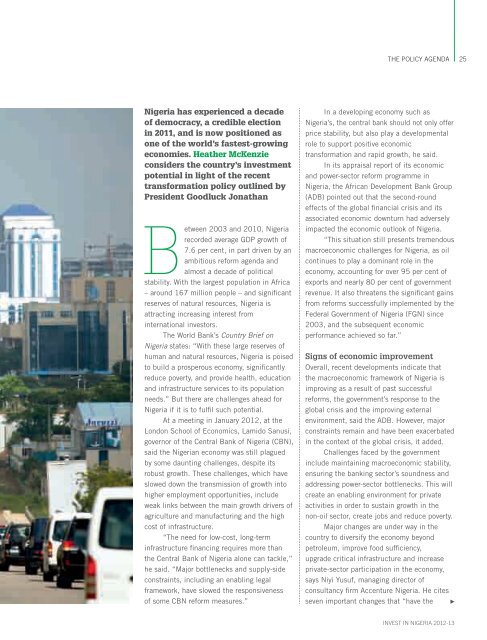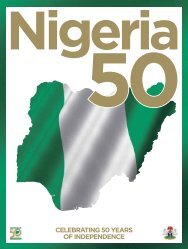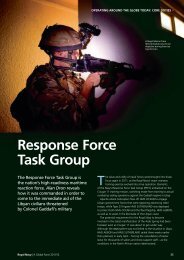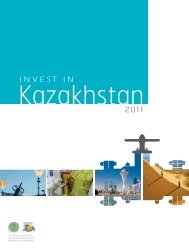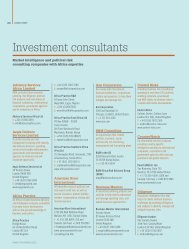NIGERIA Invest in 2012-13 - Newsdesk Media
NIGERIA Invest in 2012-13 - Newsdesk Media
NIGERIA Invest in 2012-13 - Newsdesk Media
Create successful ePaper yourself
Turn your PDF publications into a flip-book with our unique Google optimized e-Paper software.
Nigeria has experienced a decade<br />
of democracy, a credible election<br />
<strong>in</strong> 2011, and is now positioned as<br />
one of the world’s fastest-grow<strong>in</strong>g<br />
economies. Heather McKenzie<br />
considers the country’s <strong>in</strong>vestment<br />
potential <strong>in</strong> light of the recent<br />
transformation policy outl<strong>in</strong>ed by<br />
President Goodluck Jonathan<br />
Between 2003 and 2010, Nigeria<br />
recorded average GDP growth of<br />
7.6 per cent, <strong>in</strong> part driven by an<br />
ambitious reform agenda and<br />
almost a decade of political<br />
stability. With the largest population <strong>in</strong> Africa<br />
– around 167 million people – and significant<br />
reserves of natural resources, Nigeria is<br />
attract<strong>in</strong>g <strong>in</strong>creas<strong>in</strong>g <strong>in</strong>terest from<br />
<strong>in</strong>ternational <strong>in</strong>vestors.<br />
The World Bank’s Country Brief on<br />
Nigeria states: “With these large reserves of<br />
human and natural resources, Nigeria is poised<br />
to build a prosperous economy, significantly<br />
reduce poverty, and provide health, education<br />
and <strong>in</strong>frastructure services to its population<br />
needs.” But there are challenges ahead for<br />
Nigeria if it is to fulfil such potential.<br />
At a meet<strong>in</strong>g <strong>in</strong> January <strong>2012</strong>, at the<br />
London School of Economics, Lamido Sanusi,<br />
governor of the Central Bank of Nigeria (CBN),<br />
said the Nigerian economy was still plagued<br />
by some daunt<strong>in</strong>g challenges, despite its<br />
robust growth. These challenges, which have<br />
slowed down the transmission of growth <strong>in</strong>to<br />
higher employment opportunities, <strong>in</strong>clude<br />
weak l<strong>in</strong>ks between the ma<strong>in</strong> growth drivers of<br />
agriculture and manufactur<strong>in</strong>g and the high<br />
cost of <strong>in</strong>frastructure.<br />
“The need for low-cost, long-term<br />
<strong>in</strong>frastructure f<strong>in</strong>anc<strong>in</strong>g requires more than<br />
the Central Bank of Nigeria alone can tackle,”<br />
he said. “Major bottlenecks and supply-side<br />
constra<strong>in</strong>ts, <strong>in</strong>clud<strong>in</strong>g an enabl<strong>in</strong>g legal<br />
framework, have slowed the responsiveness<br />
of some CBN reform measures.”<br />
the policy agenda 25<br />
In a develop<strong>in</strong>g economy such as<br />
Nigeria’s, the central bank should not only offer<br />
price stability, but also play a developmental<br />
role to support positive economic<br />
transformation and rapid growth, he said.<br />
In its appraisal report of its economic<br />
and power-sector reform programme <strong>in</strong><br />
Nigeria, the African Development Bank Group<br />
(ADB) po<strong>in</strong>ted out that the second-round<br />
effects of the global f<strong>in</strong>ancial crisis and its<br />
associated economic downturn had adversely<br />
impacted the economic outlook of Nigeria.<br />
“This situation still presents tremendous<br />
macroeconomic challenges for Nigeria, as oil<br />
cont<strong>in</strong>ues to play a dom<strong>in</strong>ant role <strong>in</strong> the<br />
economy, account<strong>in</strong>g for over 95 per cent of<br />
exports and nearly 80 per cent of government<br />
revenue. It also threatens the significant ga<strong>in</strong>s<br />
from reforms successfully implemented by the<br />
Federal Government of Nigeria (FGN) s<strong>in</strong>ce<br />
2003, and the subsequent economic<br />
performance achieved so far.”<br />
Signs of economic improvement<br />
Overall, recent developments <strong>in</strong>dicate that<br />
the macroeconomic framework of Nigeria is<br />
improv<strong>in</strong>g as a result of past successful<br />
reforms, the government’s response to the<br />
global crisis and the improv<strong>in</strong>g external<br />
environment, said the ADB. However, major<br />
constra<strong>in</strong>ts rema<strong>in</strong> and have been exacerbated<br />
<strong>in</strong> the context of the global crisis, it added.<br />
Challenges faced by the government<br />
<strong>in</strong>clude ma<strong>in</strong>ta<strong>in</strong><strong>in</strong>g macroeconomic stability,<br />
ensur<strong>in</strong>g the bank<strong>in</strong>g sector’s soundness and<br />
address<strong>in</strong>g power-sector bottlenecks. This will<br />
create an enabl<strong>in</strong>g environment for private<br />
activities <strong>in</strong> order to susta<strong>in</strong> growth <strong>in</strong> the<br />
non-oil sector, create jobs and reduce poverty.<br />
Major changes are under way <strong>in</strong> the<br />
country to diversify the economy beyond<br />
petroleum, improve food sufficiency,<br />
upgrade critical <strong>in</strong>frastructure and <strong>in</strong>crease<br />
private-sector participation <strong>in</strong> the economy,<br />
says Niyi Yusuf, manag<strong>in</strong>g director of<br />
consultancy firm Accenture Nigeria. He cites<br />
seven important changes that “have the<br />
<strong>in</strong>vest <strong>in</strong> nigeRia <strong>2012</strong>-<strong>13</strong>


